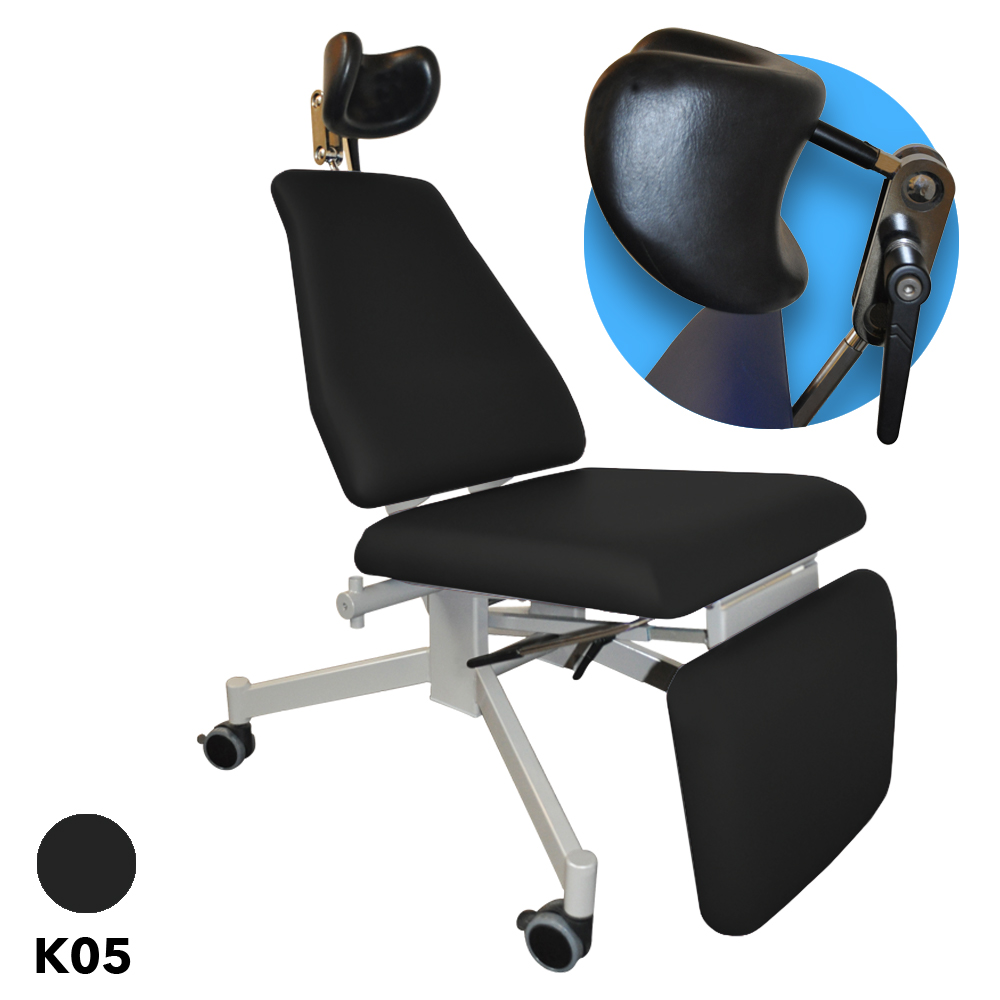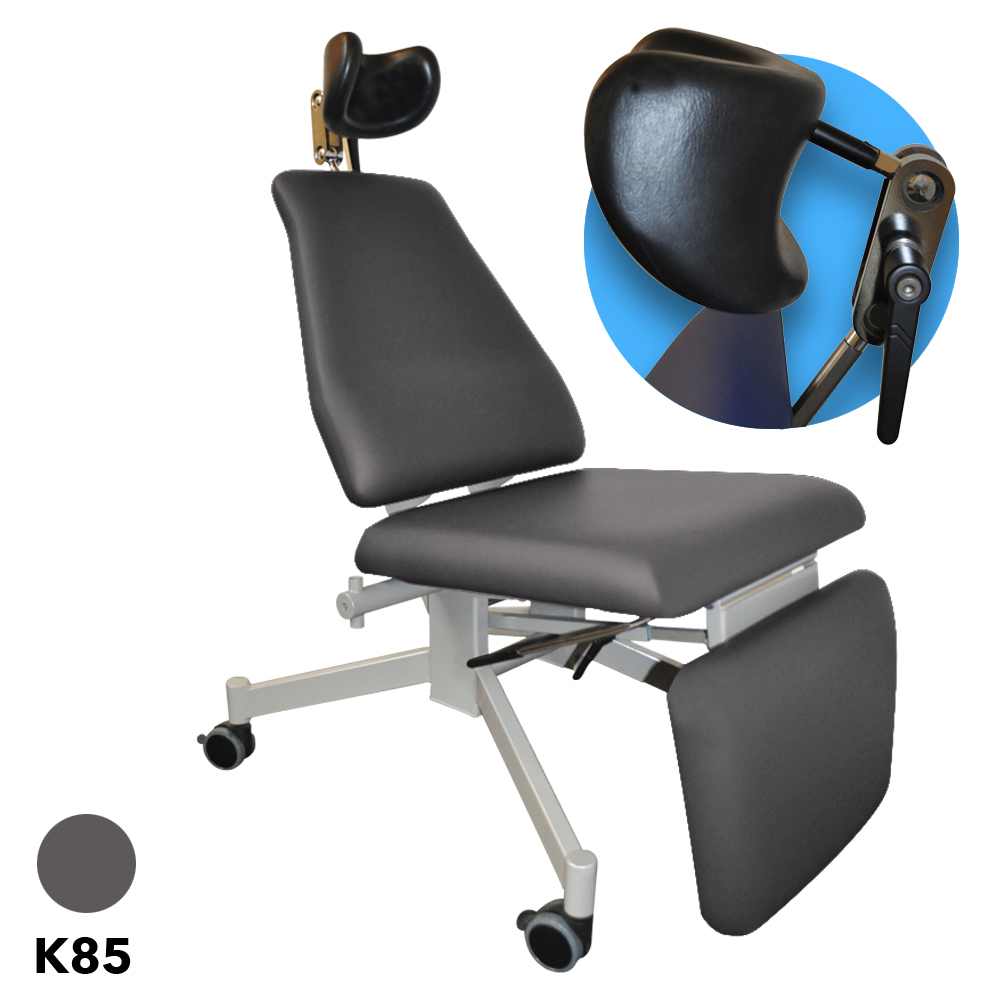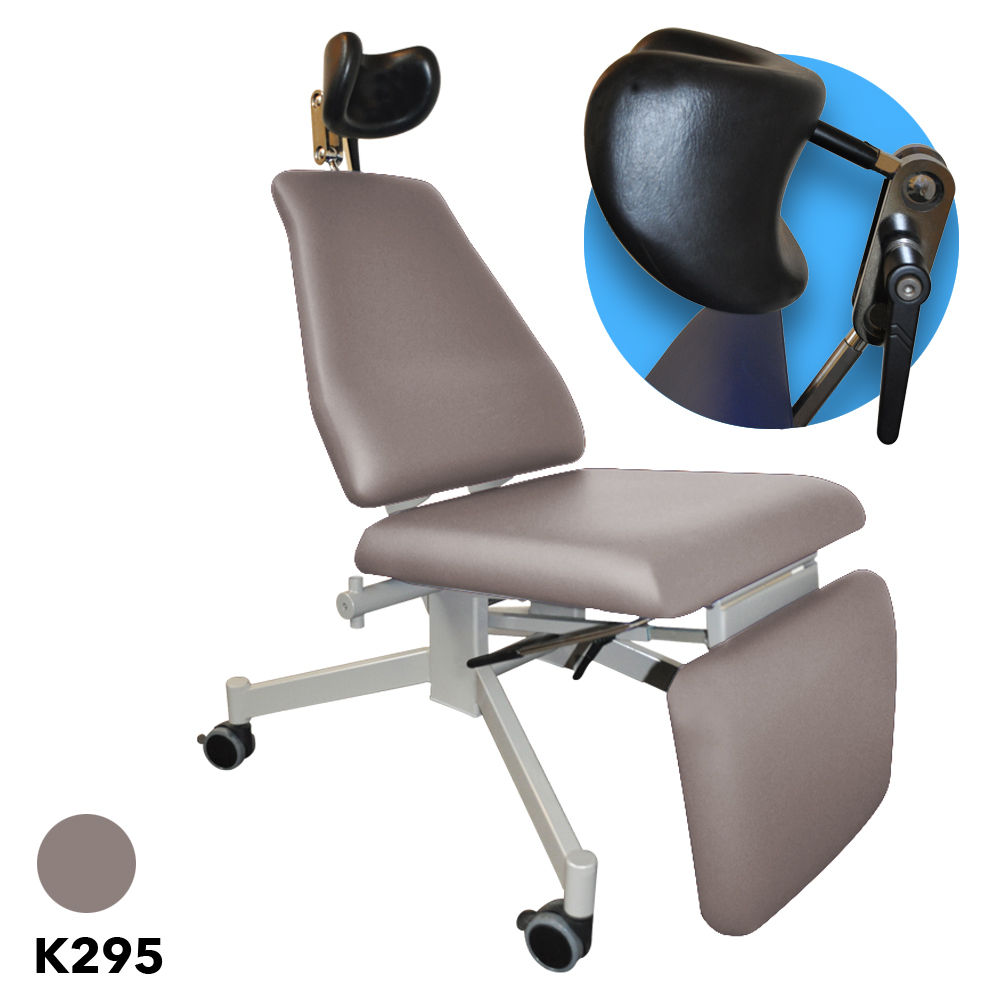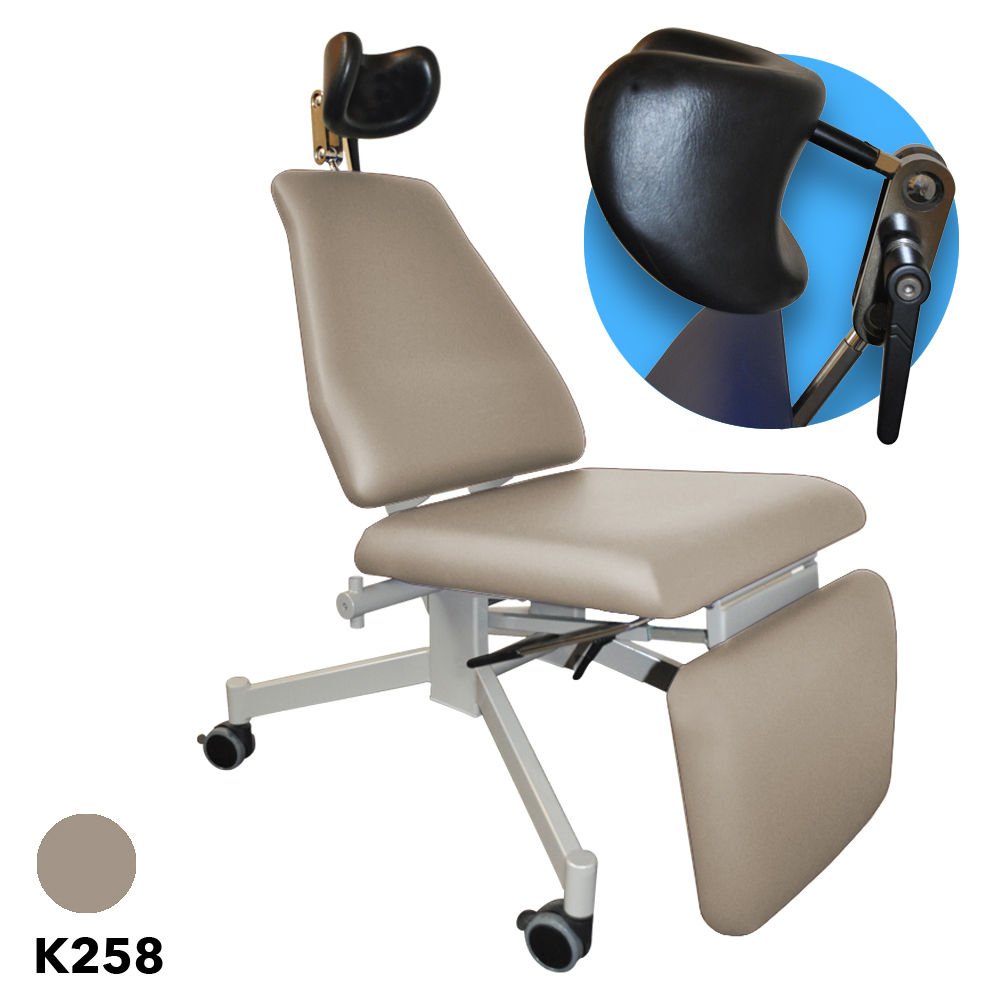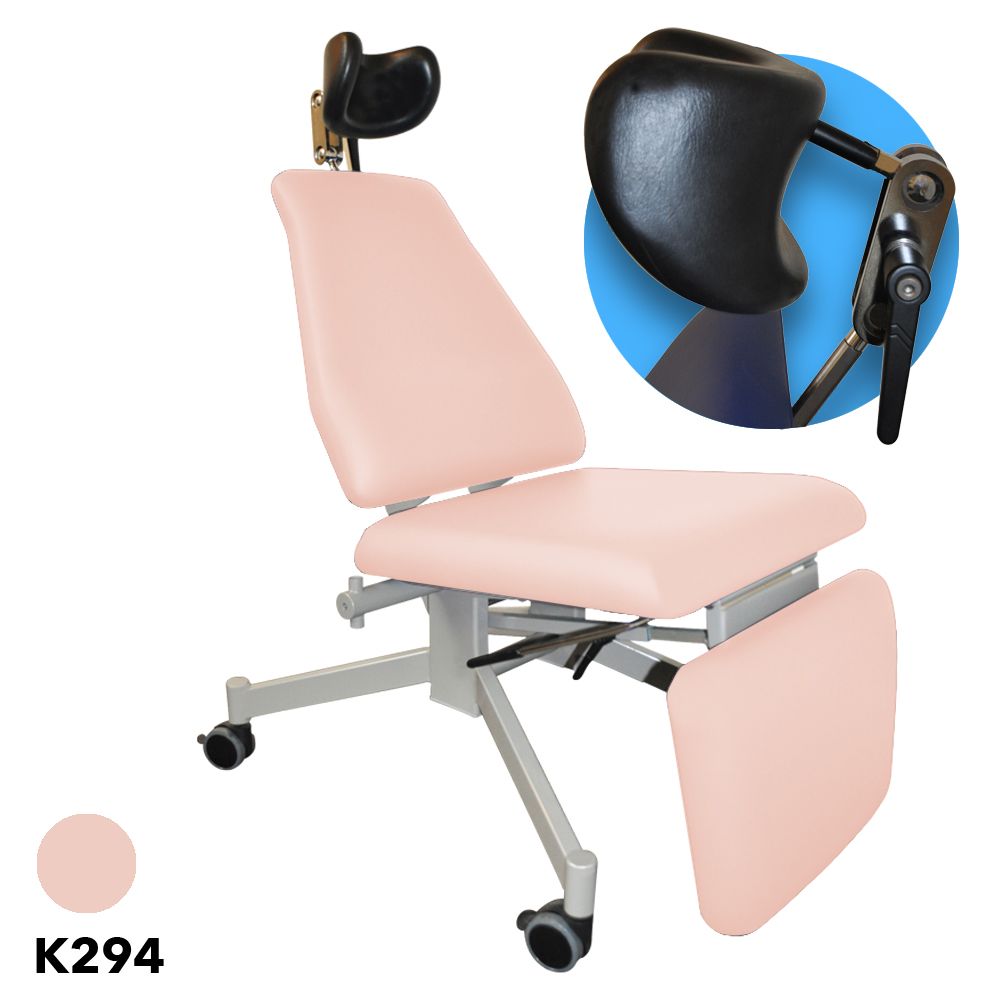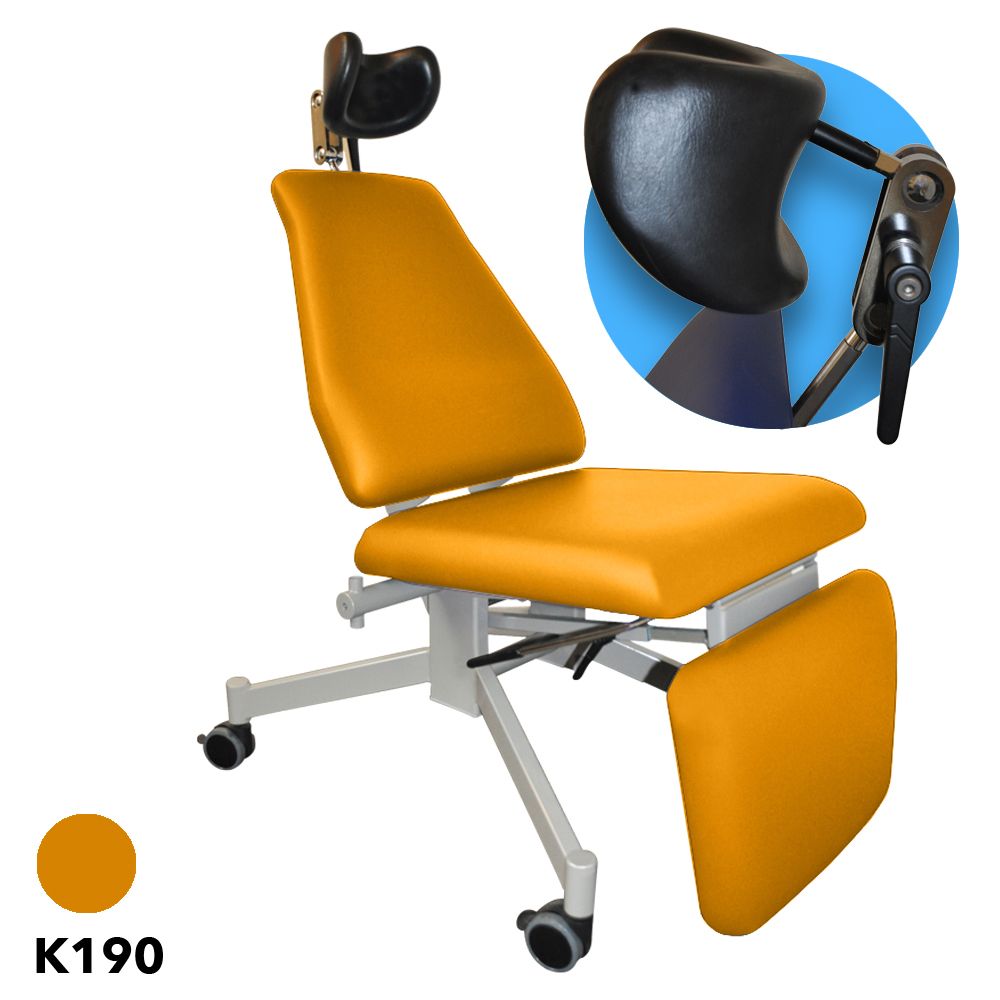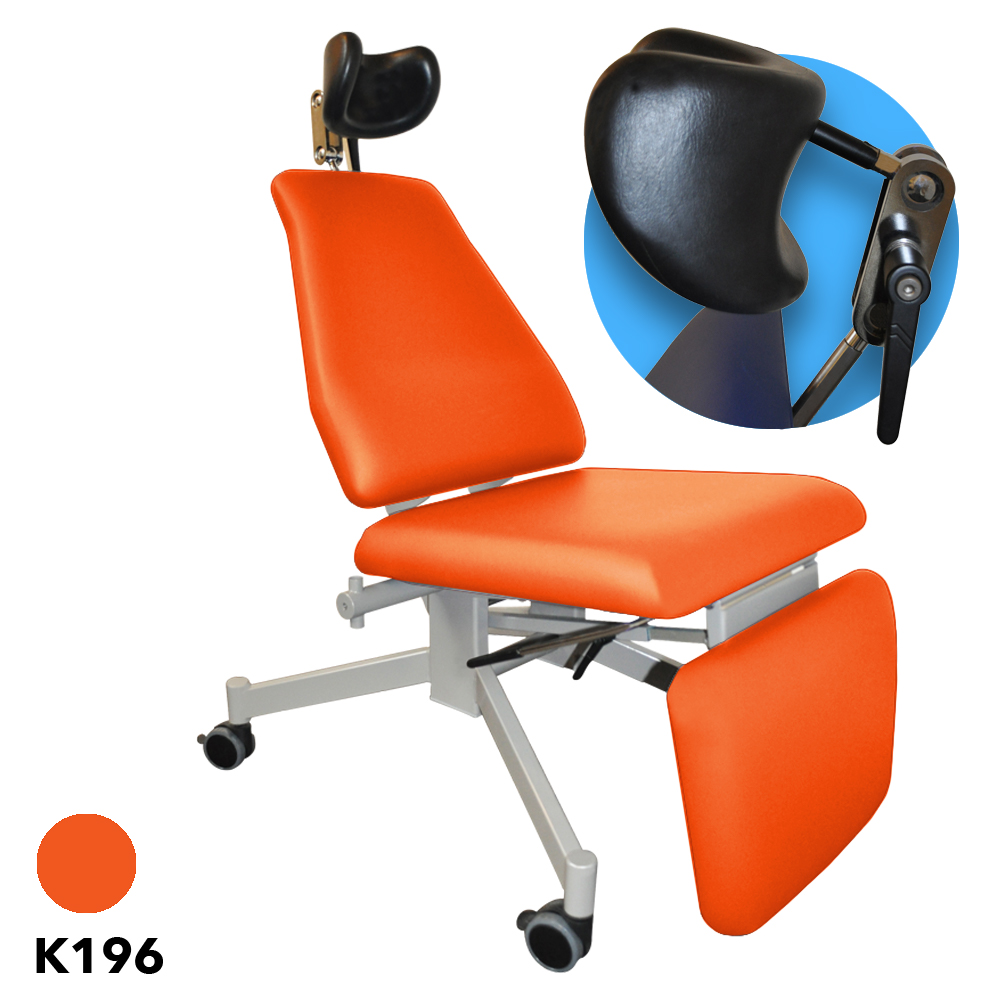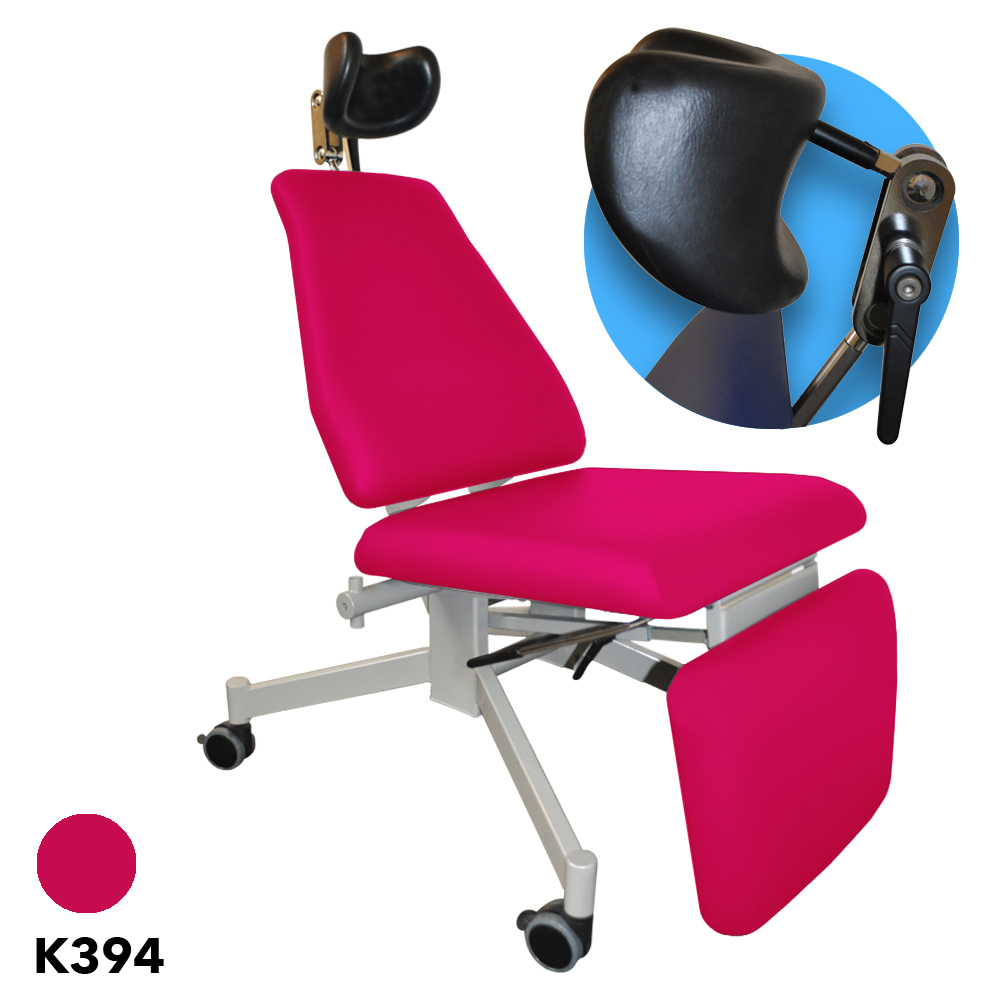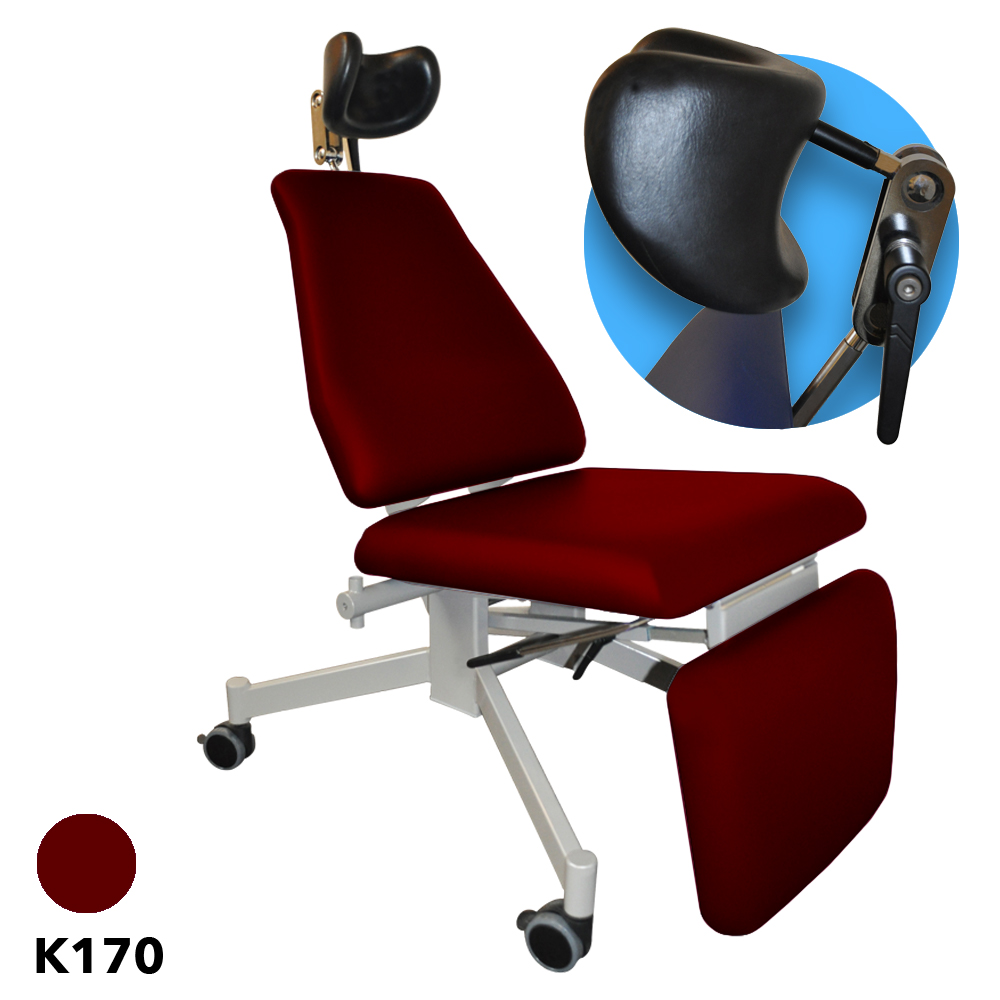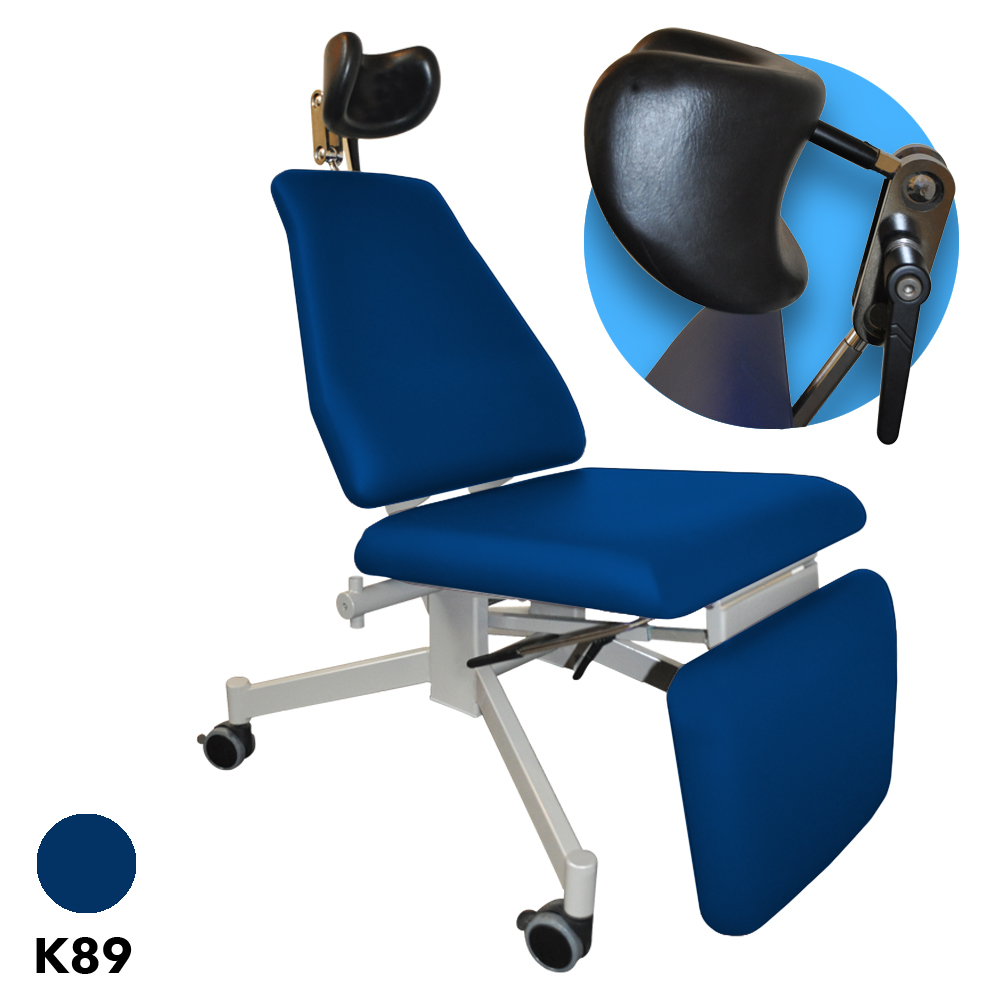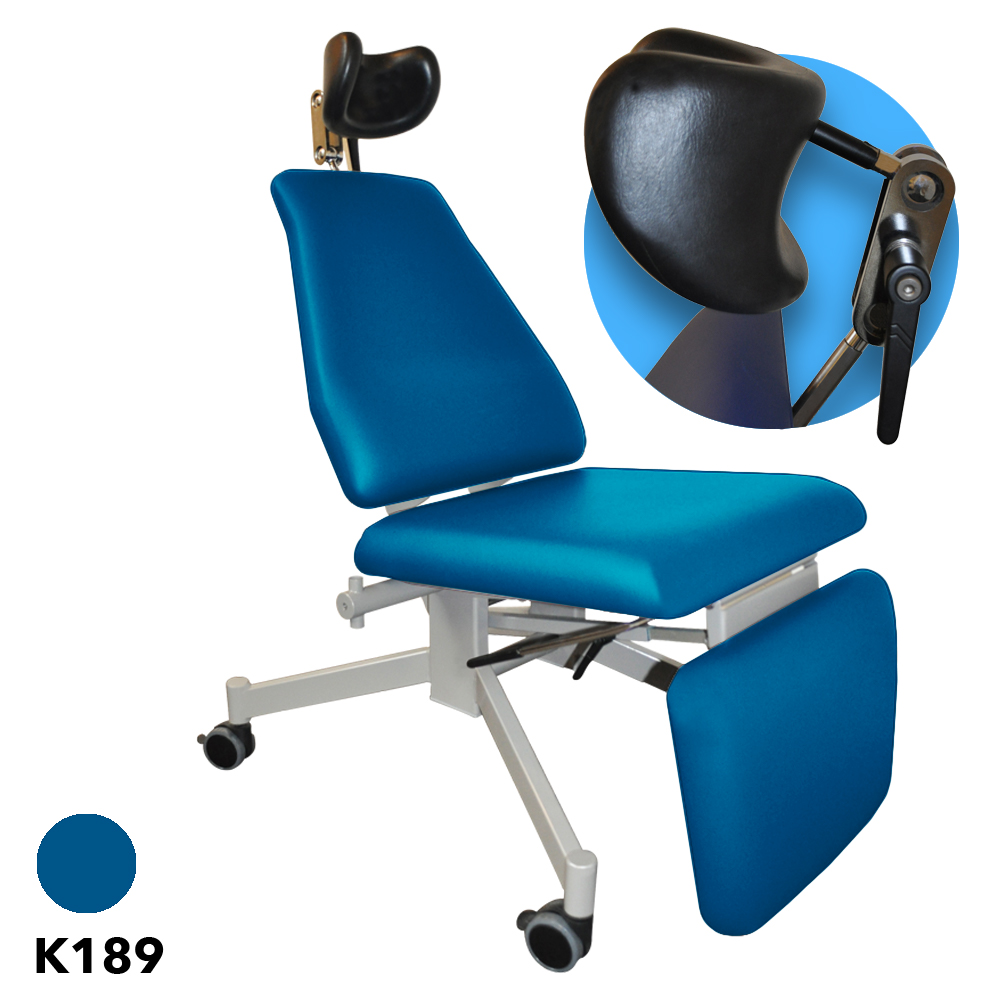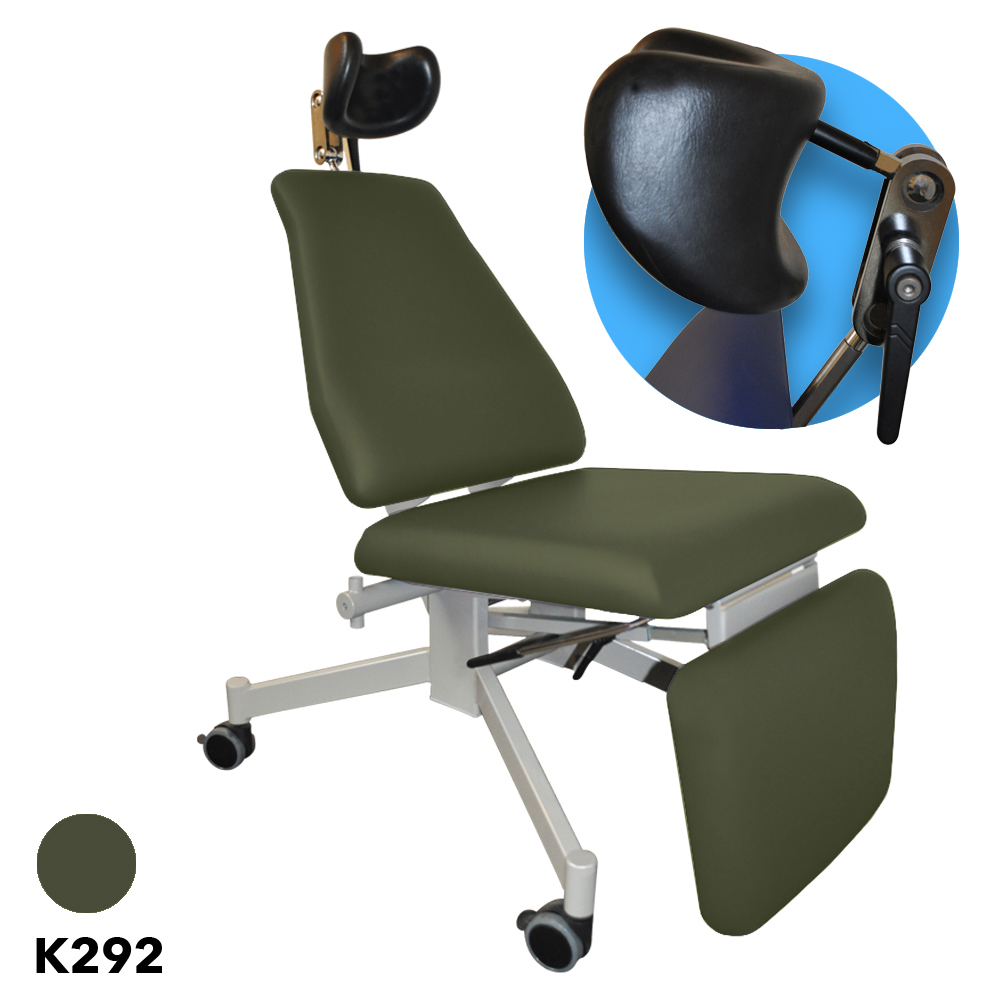Turnkey laboratory solutions
Turnkey laboratory solutions
Our expertise
Experienced and passionate
Brainclinics offers almost twenty years of experience with rTMS, neurofeedback, EEG and QEEG and we consider ourselves to be not merely up-to-date but in the forefront of developments in this Applied Neuroscience field. The scientific research by our own research institute in our own state of the art laboratory is world renowned.
We’re passionate about brains, and it shows.
We care
We can support you with our knowledge and experience in the acquisition, installation and configuration of equipment to furnish your lab or treatment facility. After we’ve set up your facility we’re always on call, should you need help or further support and advice.
We care for what we do, and we care about you.
Working with Brainclinics means you will benefit from our expertise and will enable you to provide your clients with the best assessment and best possible treatment options. Our turnkey laboratory solutions are best in class.
Turnkey laboratory solutions
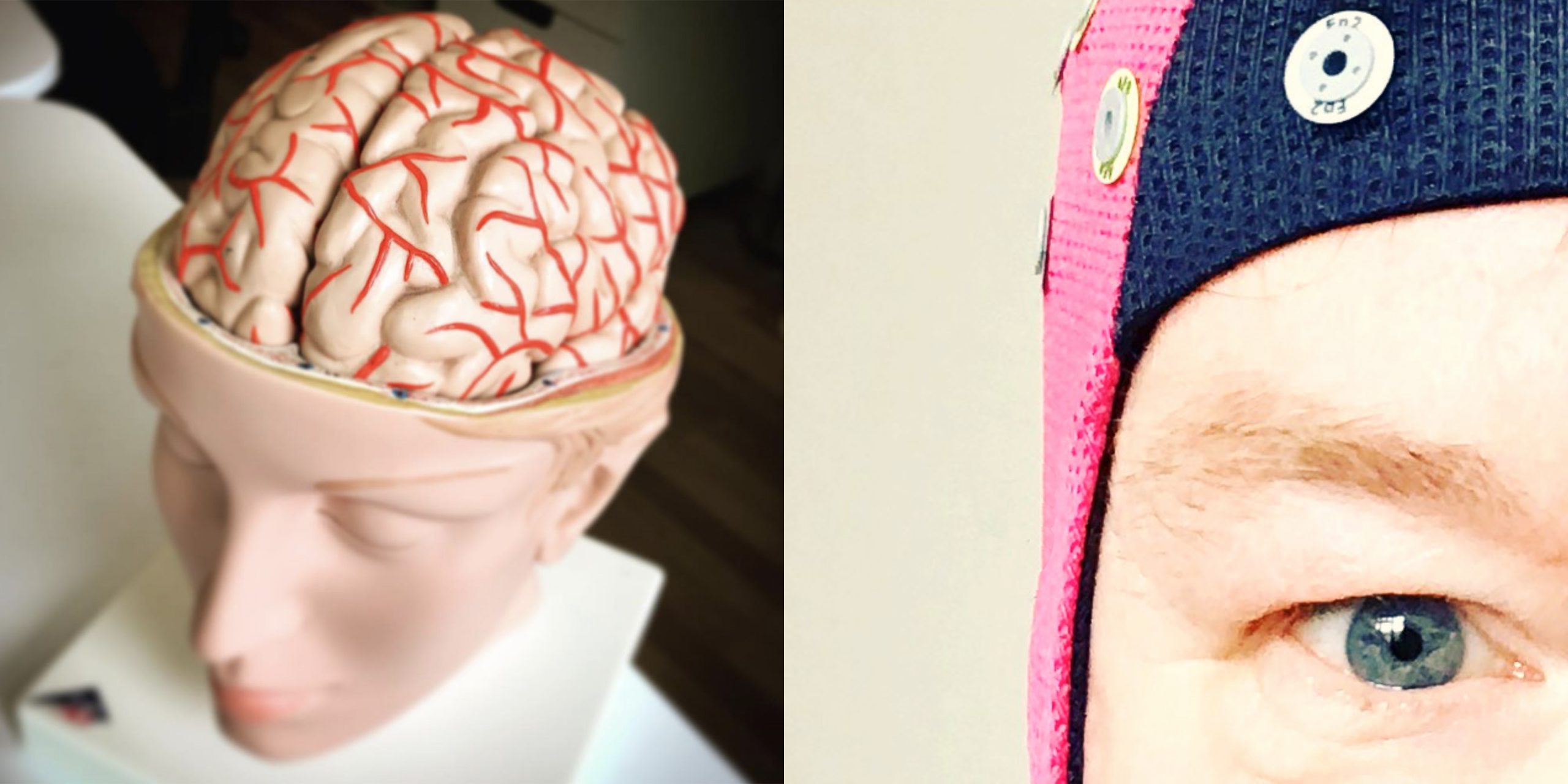
Turnkey Laboratory Solutions
Research equipment
In scientific research, especially under laboratory conditions, consistency and standardisation is key.
Research Institute Brainclinics offers almost two decades of experience in the installation, configuration and maintenance of clinical and research environments, ensuring that your assessments and research is valid, precise and correct.
Treatment conditions
The right environment is also very important when treating clients. They should be comfortable and at home within their surroundings, feel at ease and safe. Your equipment is important: it should be unobtrusive, operate quietly and be extremely reliable.
We constantly evaluate and review the equipment we choose for ourselves or recommend to others and you can be confident of the fact that we will give you the best possible advice and offer the best solutions for use in your clinic or lab.
We provide solutions
Our experts understand your needs and will work with you to ensure your lab set-up or treatment facility is ideally suited to your circumstances. We have the all knowledge and experience you need in the acquisition, installation and configuration of equipment to furnish your lab or treatment facility.
Turnkey laboratory solutions
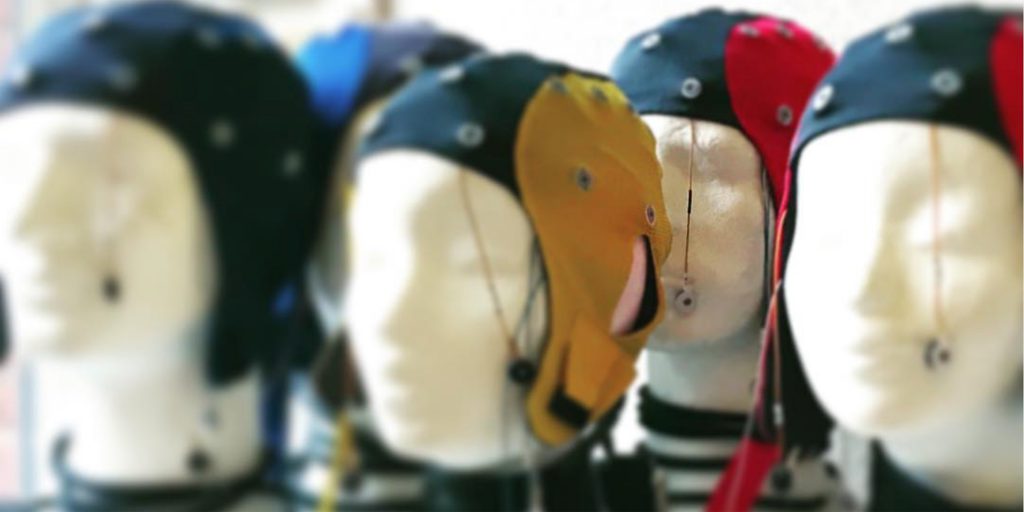
Brainclinics Brainmarker Assessment Suite
What is The Brainmarker Assessment Suite?
The Brainmarker Assessment Suite can be used to identify neuromarkers or EEG phenotypes in a range of psychiatric disorders such as ADHD, Depression, Alzheimer’s, dementia, schizophrenia, PTSD, etc. to aid in personalizing treatments such as neurofeedback or rTMS.
Find out more on our Brainmarker Assessment Suite page.
Assessing data
Besides the presence of a wide range of diagnostic groups in a database, it is also important to have a good normative reference frame. For this we can provide access to a normative database of more than 2,000 healthy subjects and large patient groups (ADHD, depression, etc.) which includes neurophysiological and neuropsychological (IntegNeuro) data, the so-called Brain Resource International Database (BRID).
At Research Institute Brainclinics we have for the last 2 decades been conducting research into the optimal use of the EEG for optimizing psychiatric treatments, also see our publications. Furthermore, with our research we’re always pushing the envelope with the newest technologies and advances, such as the use of source-localization, cross-frequency coupling and deep learning to advance a future of stratified psychiatry, or personalized psychiatry further.
Recently we’ve been researching Brainmarkers, or Biomarkers in the brain. See this article in Biological Psychiatry CNNI investigating Brainmarker-I in relation to ADHD, or this article on Frontal Alpha Symmetry (FAA) in Neuroimage: Clinical. FAA can be used as a treatment optimization prognostic biomarker in Major Depressive Disorder.
Our software can identify no less than four brainmarkers.
At Brainclinics we’re very excited to offer our turnkey laboratory solutions and expertise to you, to advance your clinic or your research!
Turnkey laboratory solutions
Become a partner in a large network
Our collaborative network encompasses clinics around the world and the wealth of data they produce are a valuable asset for our applied neuroscience. We’d love it if you would join us and are happy to offer advice to help you set up your own QEEG or EEG lab. Please contact us directly via mail to discuss the possibilities and advantages of joining our network.
History of QEEG research
Did you know that EEG and QEEG have a long history? Of course it all started with Hans Berger’s discovery in 1929, but thanks to the ‘Space-Race’ and Ross Adey at the UCLA Brain Research Institute QEEG or Normative EEG was first pioneered in the 1960’s. For a brief historical review also see our EEG history section.
Would you like to know more? The very enjoyable book “Neurofeedback, how it all started” gives an extensive, highly readable and sometimes surprising account of the history of the EEG and QEEG. Get your own copy while stocks last!
The Brainmarker Assessment Suite in practice
Take a look at our Brainmarker Assessment Suite page if you’d like to learn more about our breakthrough assessment solution.
Turnkey laboratory solutions
The EEG test procedure
The standardised Brainmarker Assessment Procedure we use runs on our own dedicated hardware and software platform. Here clients are assessed (non-invasively) while measuring brain function using EEG. In addition to Eyes-Open and Eyes-Closed EEG, clients are also assessed on a variety of tasks, such as oddball and during a resonant breathing exercise, to record Heart Rate, Heart Rate Variability and of course, most importantly, Event Related Potentials (ERP’s). These ERP measurements provide information about information processing with a millisecond time resolution. Furthermore, clients are assessed through a validated questionnaire. A comprehensive report is available about 10 to 15 minutes after the assessment.
You can find more information here: The Brainclinics Brainmarker Assessment Suite.
We use the following specific tasks in our EEG assessments:
Turnkey laboratory solutions
The EEG Assessment
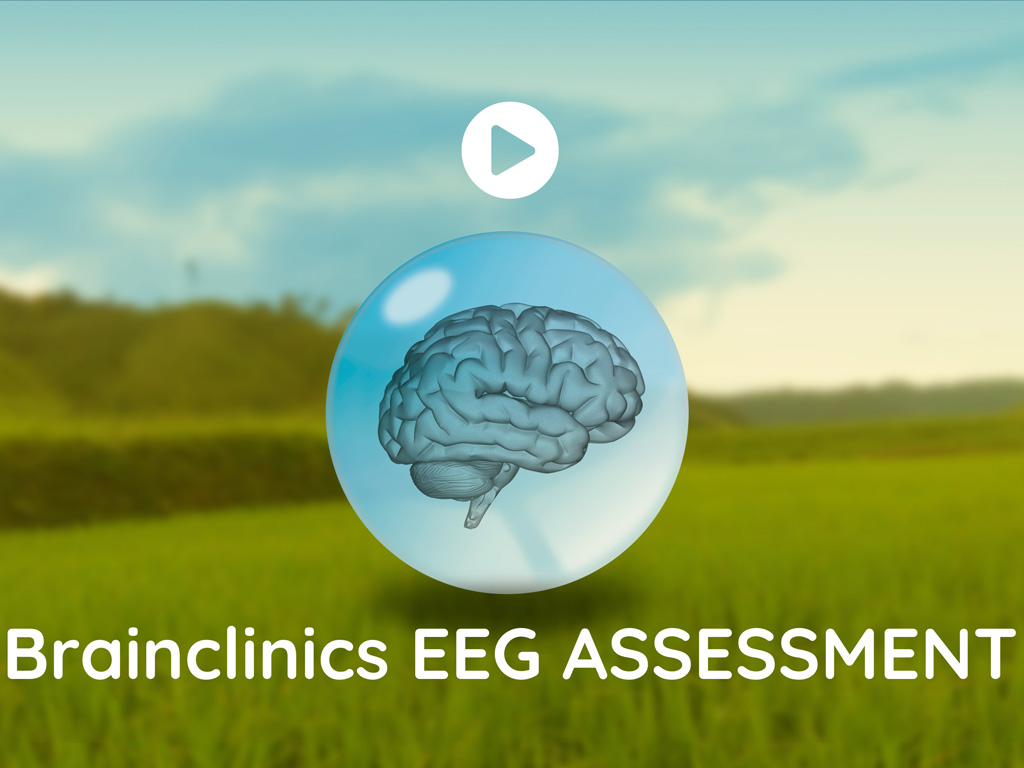 The Assessment is available in English and Dutch.
The Assessment is available in English and Dutch.
You can request other languages.
Auditory oddball
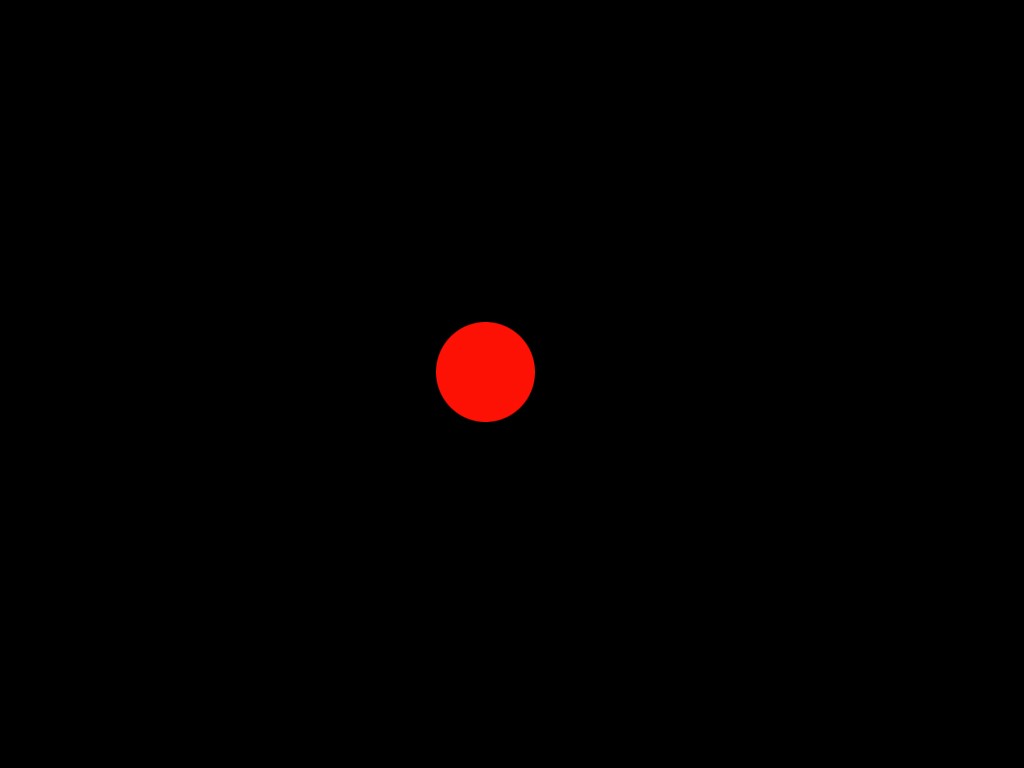 The subject is presented with tones and is required to ignore the low tones, and press a response button only when one hears the infrequent high tones.
The subject is presented with tones and is required to ignore the low tones, and press a response button only when one hears the infrequent high tones.
Reflects: Capacity to process relevant whilst ignoring irrelevant information.
Resting EEG
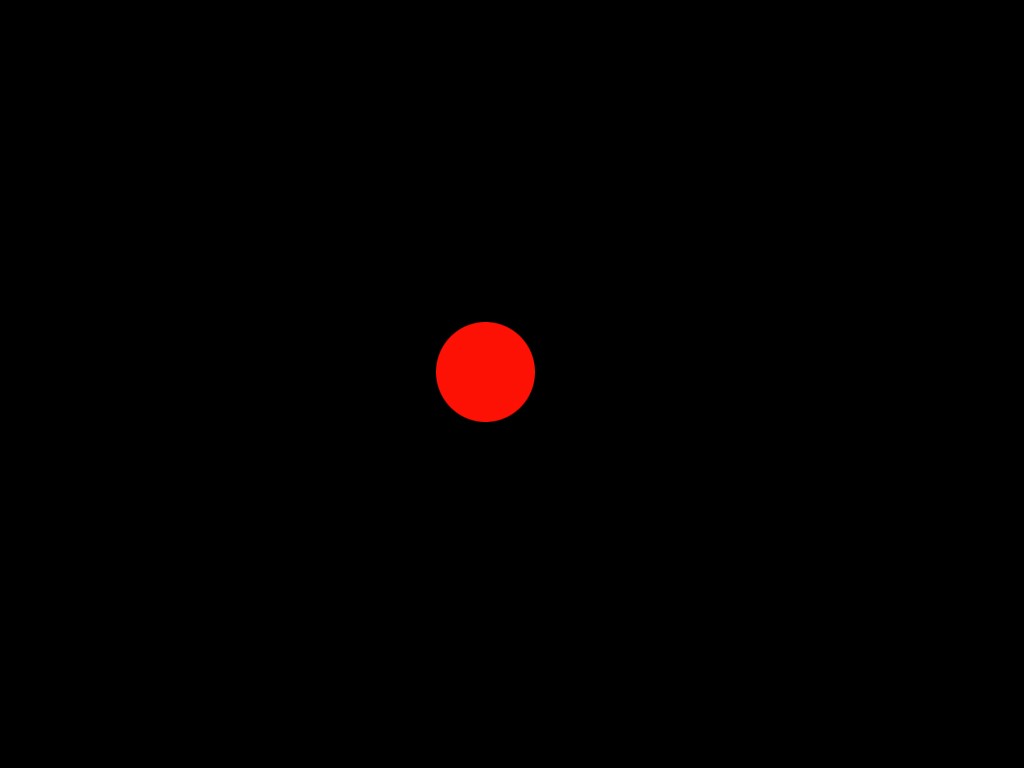 The subject is asked to sit quietly and focus on the red dot (eyes open) followed by an eyes closed task.
The subject is asked to sit quietly and focus on the red dot (eyes open) followed by an eyes closed task.
Reflects: A baseline of brain and body measures.
Resonant Breathing
 The subject is presented with an animation to guide his/her breathing frequency. The animation starts at a higher frequency, then gradually slows down.
The subject is presented with an animation to guide his/her breathing frequency. The animation starts at a higher frequency, then gradually slows down.
Result: Heart Rate and Heart Rate Variability will show an optimal rhythm at a specific frequency.
The brain (QEEG) test, including the fitting of the EEG cap, takes approximately 2 hours and the task instructions are very simple and easy to understand. The questionnaire can be executed during the fitting of the cap. All tests are used for all ages, making the database ‘assumption free’, which the natural development of a test on different age can be followed perfectly.
Turnkey laboratory solutions
What is rTMS?
rTMS stands for repetitive Transcranial Magnetic Stimulation or brain stimulation in short. When applying rTMS, a coil is put at a precise and particular location on the head. The strong magnetic field generated by the coil is converted into pulses which exit the device and then easily penetrates through the skull to reach the brain. These strong magnetic pulses can stimulate specific parts of the brain and can help normalize connectivity within specific functional networks that are implicated in for example mood or compulsions as seen in depression or OCD. For more detailed information about how rTMS works, and for what indications it can be used also our rTMS review. More information about combined rTMS with psychotherapy can be found here.
We listen
Our experience and expertise with rTMS in clinical practice and research is unmatched. Since 2006, we pioneered the technique in the Netherlands and have since then refined and advanced our knowledge and expertise to the point of perfection. We have seen equipment evolve over time, from ‘vacuum-cleaner’ based TMS cooling devices, via blown-up stimulators and the dTMS head-mounted coils to the highly portable TMS systems we can carry around for easy demonstrations. Furthermore, we’ve been instrumental in the development of new innovative TMS approaches such as Heart-Brain Coupling, and always keep the patient-perspective in mind.
We have experience with all major TMS systems and never shy in engaging with manufacturers when it comes to improving their equipment.
Our feedback matters, manufacturers listen. And we listen to you.
More information?
The devices that we work with are best-in-class, and of course they’re medical CE approved. All systems we recommend are capable of standard rTMS protocols (HF or LF TMS) as well as iTBS. Furthermore, devices can be used for DLPFC stimulation as well as more experimental protocols such as OFC-stimulation using double-cone coils.
We’ll describe them in short below.
If you are interested to apply rTMS in your own practice, or have further questions, please contact us for advice, and of course we’d be happy to provide you with a quotation too, As turnkey laboratory solutions or -if you prefer- to set up your own lab.
Would you like a training package tailored to your needs? We’ve got you covered.
Turnkey laboratory solutions
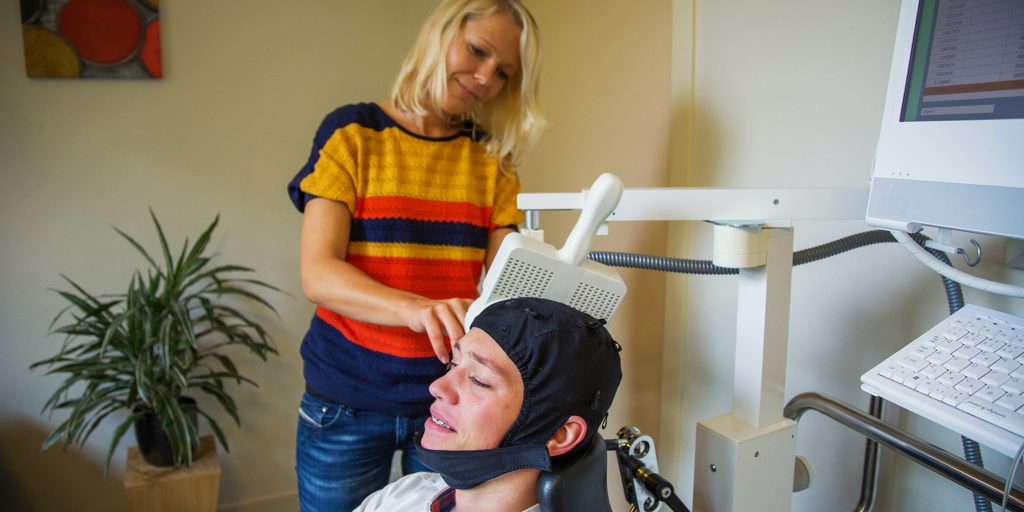
https://www.youtube.com/watch?v=z9SRSdRpFgM?start=6779
Deymed DuoMag rTMS Stimulators
Deymed has become an established worldwide leader in neurology and psychiatry for both clinical and research applications. Their aim is to develop products that meet and exceed the highest standards in neurology. High signal quality, ease of use, portability and reliability are the hallmarks of Deymed systems.
Deymed rTMS stimulators stand out by their highly innovative drive and modern design of stimulators, where extra attention is paid to ease of use, such as the counter-balanced lockable coil holder, unique to the Deymed stimulators. At the same time, Deymed stimulators have a competitive price:quality point.
This equipment has been developed recently and is based on the latest technical insights.
The DuoMag rTMS equipment can be used for different rTMS treatment protocols as well as scientific research. There are 3 models to cover your needs. In general, these are all rTMS devices with a bi-phasic pulse. You can download the brochure here.
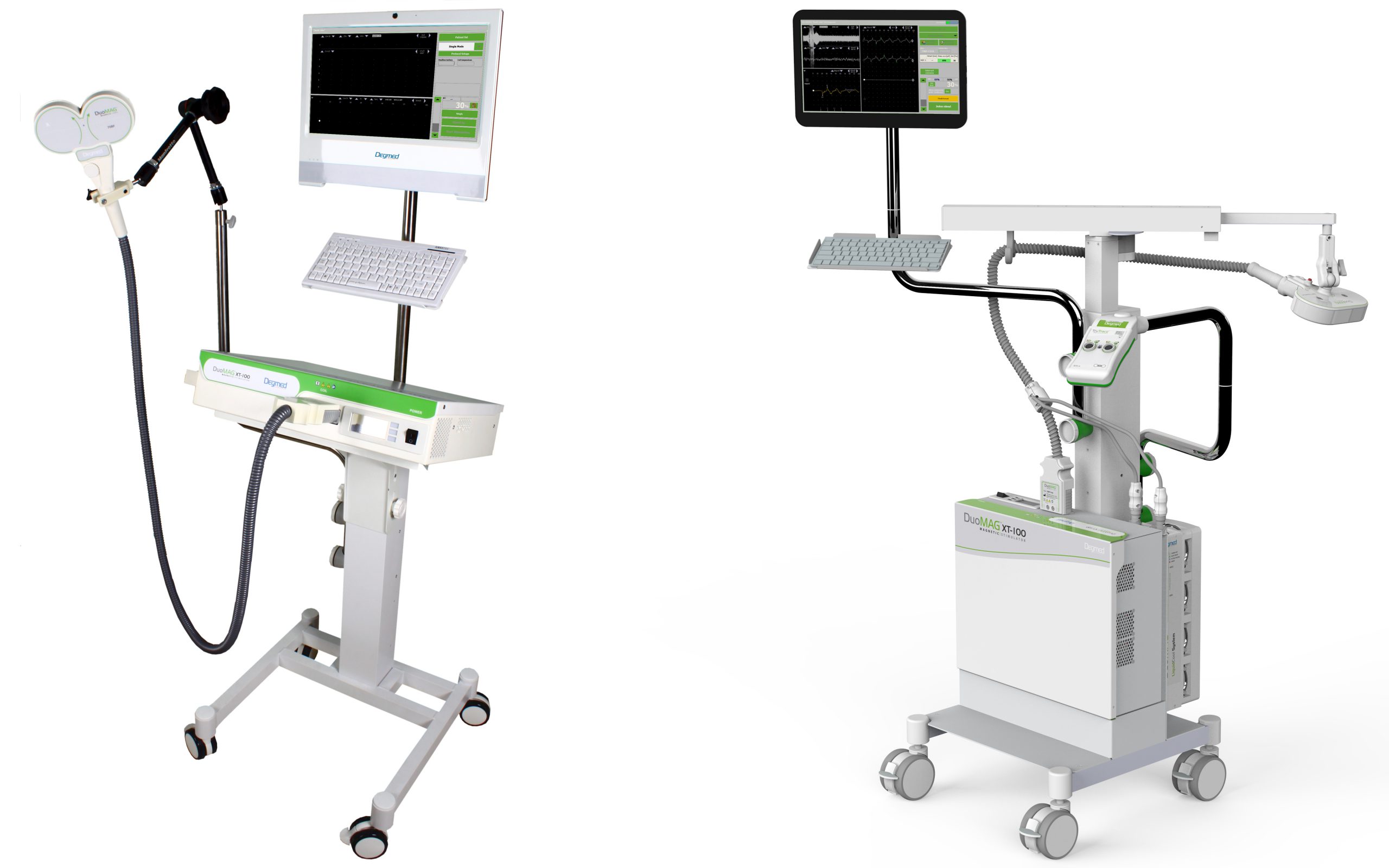
| Product specs | DuoMAg XT-10 | DuoMAg XT-35 | DuoMAg XT-100 |
| Pulse modus | Bi-phasic, repetitive | Bi-phasic, repetitive | Bi-phasic, repetitive, burst |
| Dimensions | 49x16x38cm | 49x16x38cm | 49x16x38cm |
| Weight | 17kg | 17,5kg | 17,5kg |
| Stimulation intensity 100% | 5Hz | 13Hz | 22Hz |
| Stimulation intensity 50% * | 10Hz | 35Hz | 80Hz |
| Max. repetitive rate | 20Hz | 50Hz | 100Hz |
| Min. interstimulus interval in trainmodus | 1ms | 1ms | 11ms |
| Pulse width | 290μs | 290μs | 290μs |
| Coil compatibility | Deymed coils | Deymed coils | Deymed coils |
| Voltage | 100-240Vac 50/60Hz | 100-240Vac 50/60Hz | 100-240Vac 50/60Hz |
| Synchronisation | TTL in/out and/or USB | TTL in/out and/or USB | TTL in/out and/or USB |
| Communication | USB full control on coil | USB full control on coil | USB full control on coil |
* The motor threshold (MT), which is found on 47% stimulation intensity on all of the devices for the largest part of the population (> 90%)
Further functionality:
- Equipped with special air-cooled 8-shaped coil for daily use (other coils such as a double-cone coil also available separately)
- Option for liquid cooled system (figure-8 and double-cone coil)
- Easily moveable and manageable and fix flushing arm
- Touch-screen interface and user friendly software based on Windows
- Stimulation intensity and start-stop can be set on the coil for ease of use
- Installed on a Deymed trolley with wheels so it is easy to move from room to room or within a room
MagVenture MagPro stimulators
MagVenture’s mission is to be the most dynamic and innovative supplier of transcranial magnetic stimulation solutions. Their MagPro product line, one of the most powerful, advanced and durable TMS solutions on the market – is tailored to not only suit the current needs of researchers, but also let them push the field of neuroscience and thus shape the future path of TMS. This equipment can be used for medical research as well as clinical diagnosis, monitoring and treatment of various brain disorders. Their quick and easy protocol set-up makes this equipment top of the line.
MagVenture is one of the oldest rTMS manufacturers, next to Magstim, and MagVenture is unique in its wide range of stimulation coils offered for both clinical and research purposes. Furthermore, MagVenture stimulators are overall slightly more powerful, and when combined with their oil-cooling system, there is virtually no protocol that cannot be run on a MagVenture system.
There are currently two models we recommend for clinical purposes, the MagPro R20 (brochure) and MagPro R30 (brochure).
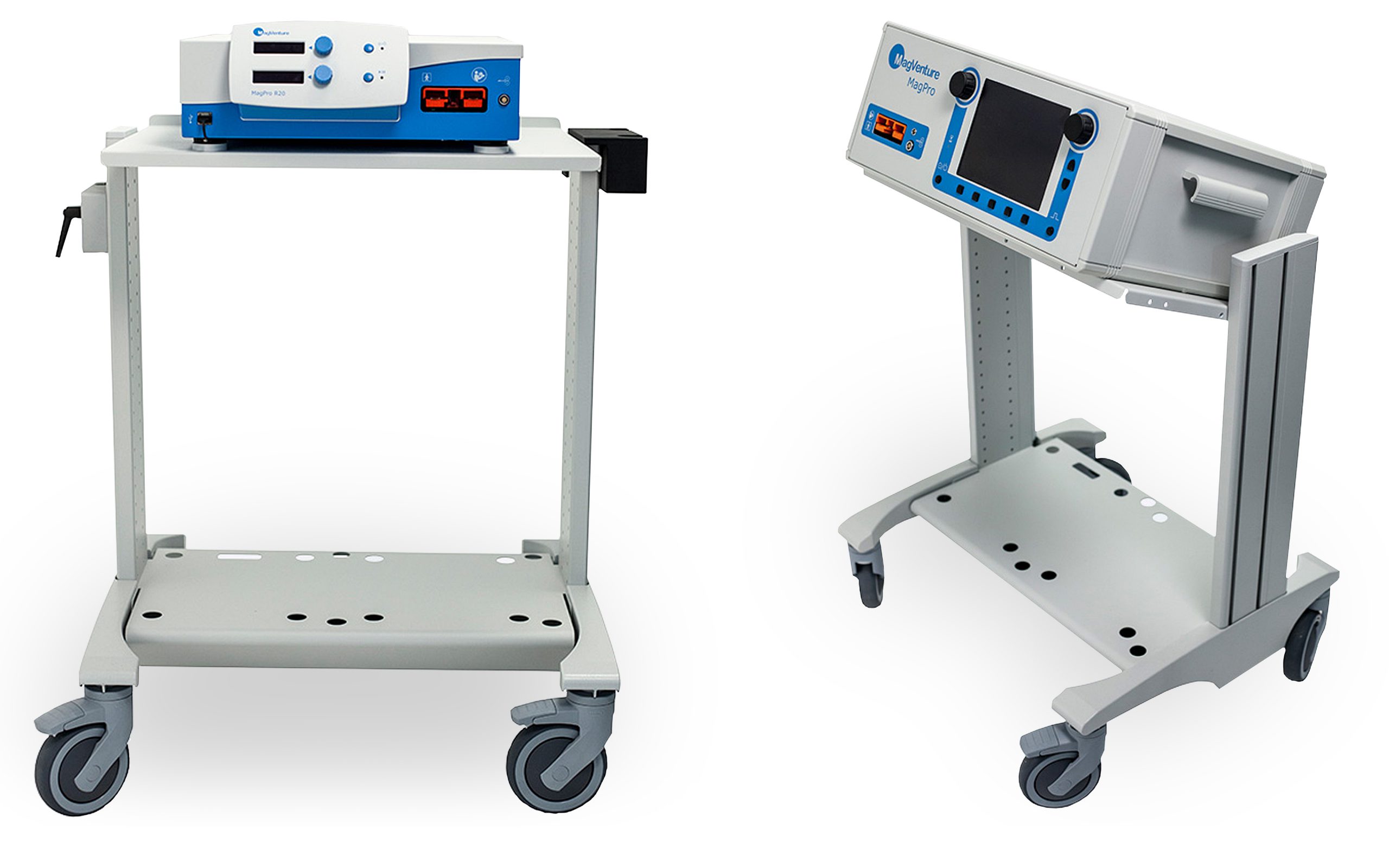
| Product specs | MagPro R20 | MagPro R30 |
| Pulse modus | Bi-phasic | Bi-phasic, Theta Burst* |
| HxWxD (mm) | 150x390x440 | 210x530x400 |
| Weight | 20kg | 36kg |
| Ramp up | no | yes |
| Max. repetitive rate | 20 pps | 30, 60*, 80* pps |
| Voltage | 230V~, 50/60Hz | 230V~, 50/60Hz |
| Power consumption | 800VA | 2700VA |
* available as add on
Neuro Cardiac Guided TMS (Heart-Brain Coupling)
Connecting brain and heart
‘…where to exactly apply rTMS?…’ is probably one of the most often asked questions in the TMS field. Until recently there were only few answers to that question, the first answer being the ‘5-cm. rule’ which has been used to locate the Dorso-Lateral-Prefrontal-Cortex or DLPFC. Later the Beam-F3 method was added which compensated for more relative differences in head-shape. However, most neurosurgeons have always been a bit wary of such approaches when applying brain stimulation. At Brainclinics we also wrestled with that question for some time, and inspired by some great research out in the field we realised that we needed to find a functional outcome representing activation of the network involved in depression. This turned out to be the Frontal-Vagal pathway (see here for a review), or the network that connects th heart and the brain. A method we thus termed: Neuro-Cardiac Guided rTMS (Heart-Brain Coupling) which can be instrumental in adequately targetting the Frontal-Vagal network.
A groundbreaking PhD thesis on this very interesting subject by one of our researchers can be found and downloaded here
NCG-ENGAGE is a biofeedback system to be used for NCG-rTMS. The NCG-ENGAGE can be used by researchers and clinicians to exact cortical area that comprises the Frontal-Vagal pathway, by looking at the individual point of maximum heart rate deceleration.
In the future, NCG-ENGAGE will possibly enable clinicians to individualize rTMS therapy for depression and other diseases for patients. The method is intended to help determine the optimal site of rTMS stimulation. Further clinical data are currently being collected.
Features
- touch display for presenting data and user interaction
- easy-to-use ECG cable for safe recording during TMS
- connecting cables for receiving the trigger from different TMS devices
- TMS trigger and ECG stored on SD card (EDF+ format)
Technical data
- R wave detection sensitivity 99.9 %
- R wave specificity 99.1 % (own data bases without TMS artefacts)
- 24 bit resolution / SNR > 90 dB / noise RTI < 15 μVpp
- ECG input for neuroConn‘s ECG cable
- input for medical DC power supply
- trigger input (BNC 5V TTL)
- SD card: speed class ≥ 10 / memory capacity ≥ 16 GB / reading speed ≥ 90 MB/s / writing speed ≥ 45 MB/s
Turnkey laboratory solutions
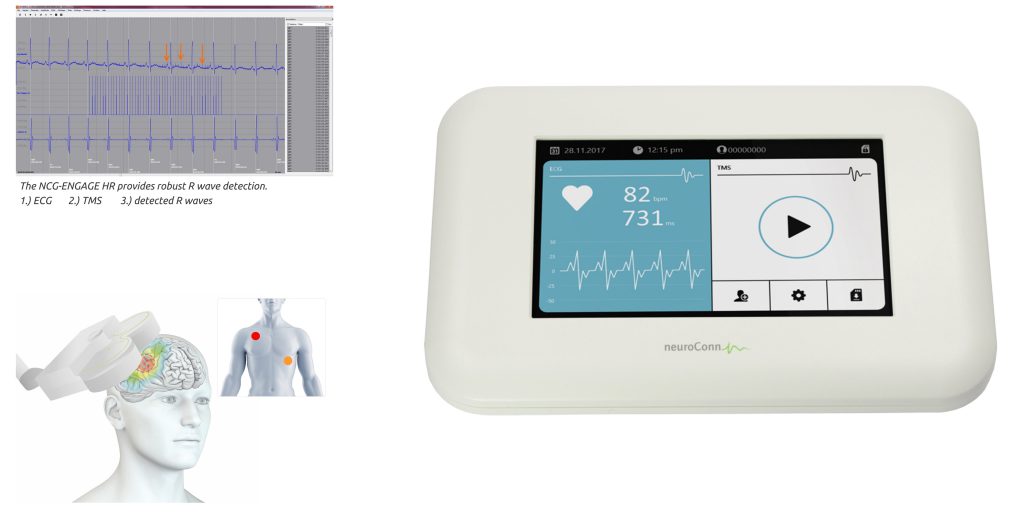
About Neuroconn
neuroConn is a leading technology brand from Germany. For over ten years they have been associated with practice-oriented medical technology used in neuroscience and clinical research, as well as in the diagnosis and treatment of neuropsychological disorders.
In close cooperation with leading research institutions and clinics worldwide, neuroConn technology is designed following the latest medical research standards, providing users with standardized and clinically evaluated protocols, based on a commitment to quality.
neuroConn offers their technology as complete, ready-to-use systems (neurofeedback and EEG). Additionally, systems can be customized and variably adjusted to the researcher or practitioner’s needs.
Interested in this revolutionary technology? Please contact us for further enquiries.
Download the NCG-Engage datasheet.
Custom rTMS chair
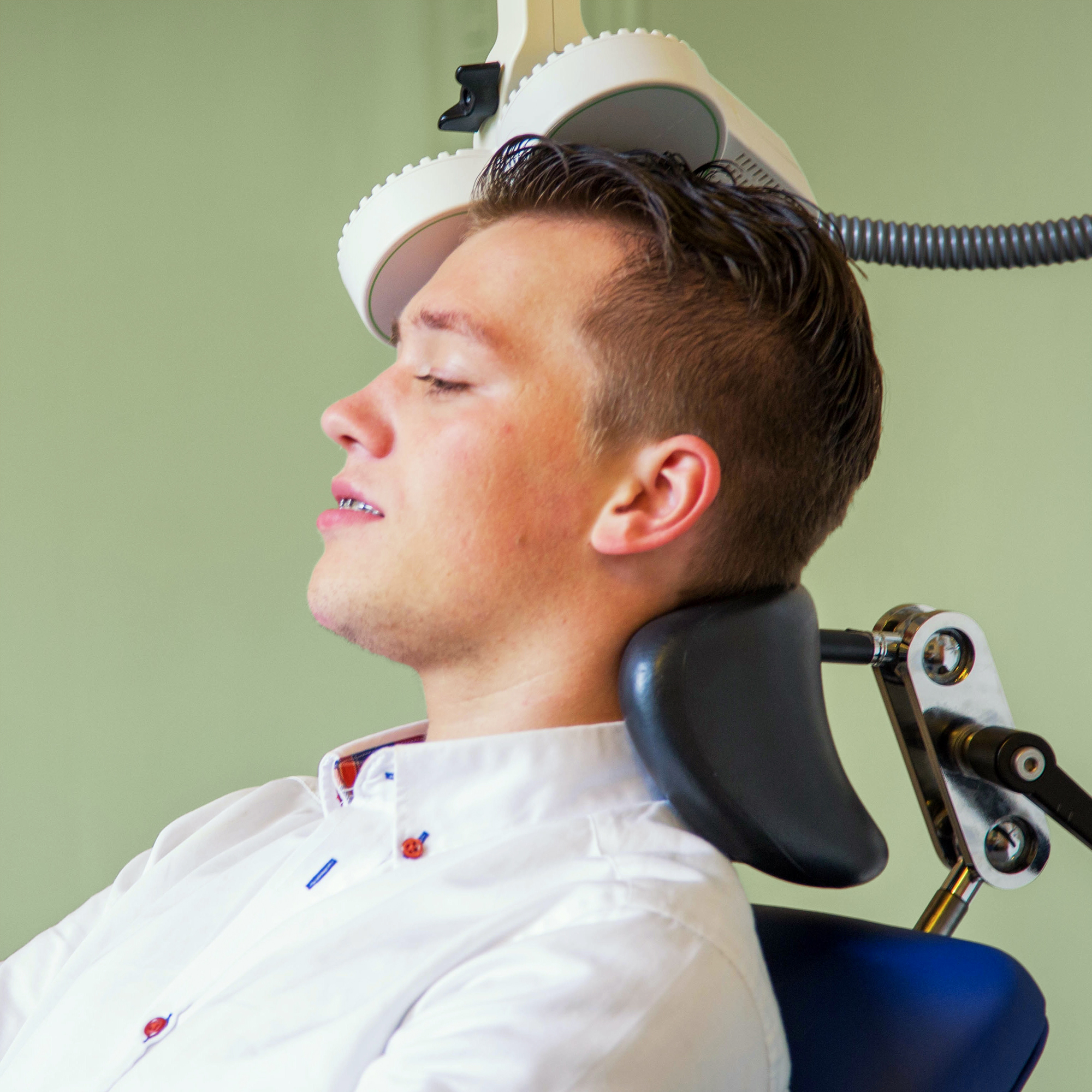
Safe and Durable
Our rTMS chairs are upholstered in a durable, high quality composite synthetic leather with anti-microbial, anti-bacterial and anti-mycotic properties. The multi layered coating offers durability and exceptional resistance to abrasion and UV. These chairs are ideally suited for intensive use and very easy to clean, and specifically designed for medical uses.
Goal
Ensuring your client’s comfort while also enhancing the rTMS treatment: that was the goal we set out to accomplish when we re-thought the idea of our Brainclinics rTMS chair. The sturdy stainless steel neck-support base is completely adjustable (up/down, forward/backward, sideways and rotation/angle) using just one easily manipulatable lever. The support “pillow” itself is comfortably soft and very easy to clean, and will keep the head in place and restricts the amount of movement, for more accurate TMS targetting.
Turnkey laboratory solutions
This versatility ensures a reclining position that is very relaxing for your client, and provides ideal circumstances for rTMS treatment: a relaxed client will not be fidgety and won’t move around a lot, thus greatly improving coil positioning and pulse targeting without the use of restraints.
Development
This chair is specially designed and customized by Brainclinics for the treatment of clients with rTMS. We asked our clients to evaluate their comfort or discomfort during treatment and applied their feedback to the ergonomic design of the chair and especially the neck support. During the prototyping phase we tested many different forms before choosing the perfect design.
Options
Our comfortable, versatile and easily adjustable rTMS chair is available in many colors, while we also offer arm rests and swivel wheels as options.
Please contact us for pricing and shipping.
Note: colors on product photos are an approximation and not an exact match.
Turnkey laboratory solutions
We facilitate:
- complete lab set ups
- hardware sales
- software
- instruction
- consultancy
- instruction
- analysis
- advice
Our experts can…
- advise you on setting up your laboratory
- help in interpreting test results
- help you calibrate your lab equipment
- …

